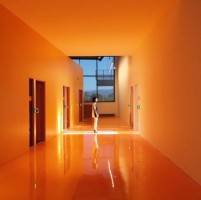April 2, 2015
New study explores link between workplace design and productivity
 The latest report linking specific workplace design elements with increases in productivity and wellbeing has been published by flooring manufacturer Interface and organisational psychologist Cary Cooper. The Human Spaces report into The Global Impact of Biophilic Design in the Workplace, claims that employees who work in environments with natural elements report a 15 percent higher level of well being, are 6 percent more productive and 15 percent more creative overall. The report is based on a study of 7,600 office workers from 16 countries. It concludes that office design is so important to workers that a third (33 percent) of global respondents believe it would ‘unequivocally’ affect their decision whether or not to work somewhere. Design is particularly important in India (67 percent), Indonesia (62 percent) and the Philippines (60 percent).
The latest report linking specific workplace design elements with increases in productivity and wellbeing has been published by flooring manufacturer Interface and organisational psychologist Cary Cooper. The Human Spaces report into The Global Impact of Biophilic Design in the Workplace, claims that employees who work in environments with natural elements report a 15 percent higher level of well being, are 6 percent more productive and 15 percent more creative overall. The report is based on a study of 7,600 office workers from 16 countries. It concludes that office design is so important to workers that a third (33 percent) of global respondents believe it would ‘unequivocally’ affect their decision whether or not to work somewhere. Design is particularly important in India (67 percent), Indonesia (62 percent) and the Philippines (60 percent).


























March 31, 2015
Time to move on from the anachronistic display screen equipment regulations
by Mark Eltringham • Comment, Legal news, Wellbeing, Workplace design
Not much of a guide to milking a Friesian
The European Display Screen Equipment Regulations were introduced in 1992 as a way of improving the posture and wellbeing of people working on computers in the office. That’s a long time ago. Too long, in fact. Here’s a list of thing that have happened since then – 1. The Internet. Actually, we can stop there. Any piece of workplace legislation that predates the Internet almost certainly won’t be fit for purpose, not least one that is based on how we should work with computers. Yet there it all is on the Health and Safety Executive (HSE) website. It’s all so hopelessly out of date, it’s like starting a farm using an Altamira cave painting as your guide. At the most straightforward level, you can take an image from one of the published guides such as this (below) and play a little game of spot the anachronism.
(more…)